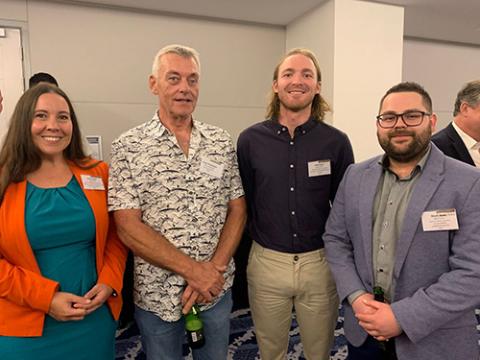The FRDC’s National Seafood Industry Leadership Program (NSILP) faced an uphill challenge when COVID-19 disrupted its face-to-face format. However, its participants rallied to support each other and a promising new model of operating emerged.

Photo: FRDC’s National Seafood Industry Leadership Program (NSILP)
Jill Briggs, managing director of Affectus, which runs NSILP for the FRDC, says three cohorts of participants are currently undertaking the program but they have been unable to complete it due to the COVID-19 pandemic. Two groups started in 2020 and one in 2021.
NSILP, the seafood industry’s premier leadership development program, spans six months with three blocks of three-day workshops. These are usually held in a regional area, then at the Sydney Fish Market and finally in Canberra, where participants meet decision-makers and attend Parliament.
Working together
The program exposes participants to guest speakers and networking events and breaks them up into small groups to work on an industry-relevant project. At the end of the six months, the groups present their projects to industry and government dignitaries in Canberra and seek assistance to complete them.
‘There are some great projects this year, including one about educational resources for pre-primary schools, getting kids to know about the industry really early, and another on how to communicate the success stories of the industry to people’, Briggs says.
Other projects underway include investigating where the industry can best put its effort to assist people in the digital learning space, and where seafood as a topic could be placed in the curriculum to encourage school-leavers to enter the industry.
The FRDC has run NSILP since 2000 and there have been about 300 graduates to date. Participants come from all parts of the seafood industry; from recreational fishers to traditional owners living in the Torres Strait, small business owners to Australian Government employees. Graduates are of all ages and come from all sectors of the industry, including people working as processors, exporters, importers, marketers and deckhands.
Most people take part in NSILP primarily because they want to see change in the seafood industry, either at a micro or a macro level, Briggs says. ‘Our philosophy is that we want to grow skills, knowledge and industry networks and to initiate leadership experience.’
COVID-19, though, put a dampener on the usual in-person events.
Real support, virtually
‘With COVID, we put the participants on pause and spent additional time with them in Zoom meetings supporting and encouraging them, making sure they were okay and still working on their projects and connecting as a group’, Briggs says.
Participants were reluctant to have the program moved online and some felt anxious about it. However, the first three-day block of virtual meetings went well and participants reported that they felt it had been a great experience. Nonetheless, one group opted to wait until February 2022 and meet in person after the tragic death of one of its members. The participants have been ‘incredibly supportive of each other’, Briggs says.
‘Even though they’ve been through unsettled times, the program has given the participants a new perspective on how the industry could work. It let them see that, while it was sometimes necessary to meet face-to-face in the industry, there is also power in doing it virtually.’
One cohort called the Port Lincoln Group (because that’s where they had started their program) opted to continue the program online and was taken on virtual tours of three seafood businesses in Townsville, Sydney and Melbourne. ‘Had we been tied to meeting in one place geographically, there’s no way we would have seen those three amazing industry businesses’, Briggs says.
A virtual ‘drinks night’ also allowed the participants to meet people from all over Australia rather than just the people who’d normally come physically to the event. ‘It was a fantastic networking activity.’
The FRDC is considering funding a pilot version of NSILP that is fully online. ‘If this funding is provided, it will allow for comparison of online and face-to-face outcomes. The data will tell us what works for people and what doesn’t. We might come out with a shiny new product at the end of it’, Briggs says.
A downside of the program has been that the NSILP lost about 20 per cent of its participants. ‘Some, for instance, decided to be with family located overseas during COVID.’
Alumni network
Those who undergo the NSILP bring new skills and perspectives to the hundreds of seafood industry organisations that exist across Australia.
‘To have people moving out into the industry who understand teamwork and the concept of working across sectors, who understand the challenges of different life experiences and who have an appreciation of all levels of the seafood industry, is gold to the industry.
‘Feedback from alumni indicates that they appreciate how important, rich, valuable and strategic it is to have a strong network that they can bring into whatever room they walk into’, Briggs notes.
Writes one graduate: ‘The NSILP gave me confidence in my own ability to be able to engage with stakeholders and share my ideas. It has helped me in numerous roles since the program.’ This graduate has since taken on roles to the National Seafood Industry Alliance and the Aquaculture and WildCatch Industry Reference Committee.
The three groups from the 2020 and 2021 programs are scheduled to graduate from the NSILP by the end of May.
Applications for the NSILP 2022 will open in March. Contact admin@affectusaus.com.au for further information.
MORE INFORMATION:
Affectus, www.affectusaus.com.au
FRDC RESEARCH CODE: 2017-003





